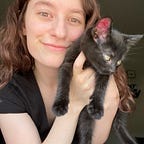The Public Disconnect
Science, for a long time, has often portrayed itself as being too complex for the minds of the general public. Thus creating a separation between information in a scientific context, and that of which is communicated to the general public. Massimiano Bucchi describes in his writing, Of Deficits, Deviations, and Dialogues, this disconnect between what is portrayed to the public and what the actual experience of the scientists is. He states that often “at the popular level, doubts and disclaimers disappear: the distinctions and nuances of specialist knowledge condense into elementary and compact formulas.” That means that the image of scientific discovery often comes across as certain, not debated or unsure, and emphasizes what the public wants to here. In depictions shared by David Kirby and Dr. Chanda Prescod-Weinstein this public effect is shown to possibly do more harm than good.
In her presentation “The Right to Know and Understand the Night Sky,” Dr. Prescod-Weinstein details her upbringing and experience becoming scientist. She talked about how she struggled and came from little money, and how she was often told that she could never find success in science because of her gender and/or her race. But she pressed on and went to Harvard, eventually becoming successful in the field, teaching in a faculty position in theoretical cosmology, and earning a PhD. She talks about how the public would view her as a success story, doing what most people like her couldn’t, but she tells a more personal side of that. She discussed how in obtaining the success that she has, she has lost touch with how she was raised, and with how she was used to dressing and acting. She also talk about how, even though she has broken through and become successful, it does nothing that impact the racism that is systemically present in our country. She goes on to argue against the idea that some of these marginalized groups may be exceptional, like asking “what if a refugees child could solve dark matter if we just gave them a chance?” Which ultimately frames them as only having value if they could add to our country. She argues instead to break down the system that prevents them from gaining opportunities, and to allow everyone the chance at education and knowledge.
David Kirby takes a slightly different approach at outlining this disconnect between the scientific community and the vernal public. He talks about how the concept of wonder is often used to attract the general public to scientific publications, such as documentaries. This concept of wonder, which can be and is often easily connected with religion and spirituality can “give the false impression that scientists are never wrong and that uncertainty is not an integral part of the scientific process.” Instead of promoting questioning and further research by the public who watches these films or reads these publications that outline science in a frame of wonder or awe, they prompt the public to simply marvel at the discoveries the scientists have already made. It brings the attention of the public, yes, but it does nothing for the actual improvement of science or scientific ideas. This should be a benefit of sharing works with the public, including other opinions or ideas, but instead it gives scientists a false persona of being authoritative and always correct.
